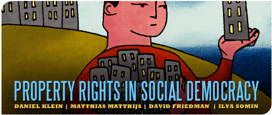There is only limited disagreement in this exchange between Daniel Klein and myself. We both favor strong protection for private property rights, and we both reject claims that the government should have largely unconstrained authority to override those rights because it supposedly “created” them or because the owners have consented to it.
However, I do continue to disagree with Daniel’s claim that “leftist talk about [property rights and government] entails the collectivist configuration of ownership, or overlordship.” I think that is true of some left-wing rhetoric about these issues, but by no means all or even most of it. As I pointed out in my original reply essay, most modern liberal rhetoric justifies government intervention on consequentialist grounds, not on the basis that government owns everything.
Daniel himself recognizes, “one could affirm the individualist configuration of ownership and then go on to say that he nonetheless favors the myriad initiations of coercion of the modern activist state.” In my view, this is in fact what most American left-liberals (and many European ones) do. They accept the basic idea of private property rights (what Daniel calls the “individualist configuration of ownership”), but then claim that such rights must often be overridden in order to achieve beneficial consequences such as promoting equality, increasing social welfare, protecting the environment, eliminating “blight,” and so on.
This is not to say that the “collectivist configuration” Daniel attacks is a straw man. Ever since Plato, a variety of prominent political theorists and legal scholars (not all of them leftist) have espoused just that. It is certainly an important idea whose serious weaknesses are worth pointing out — as I tried to do in my reply essay. But it is not quite as ubiquitous as Daniel seems to assume.

